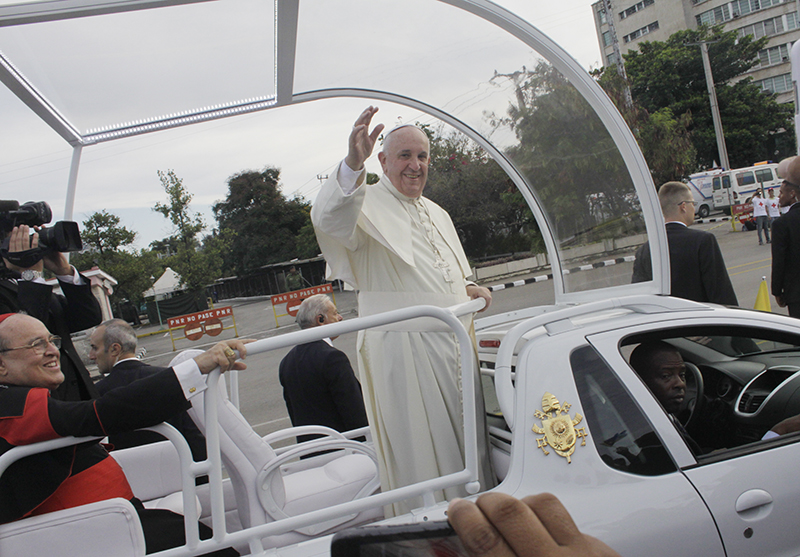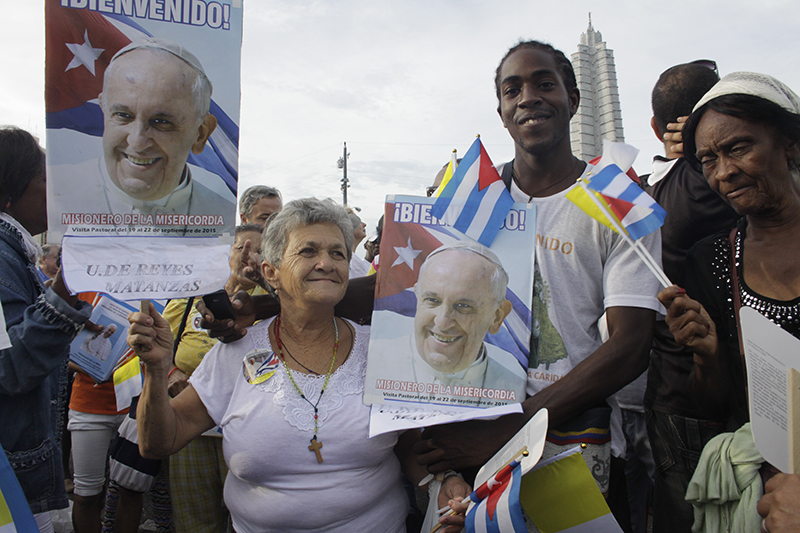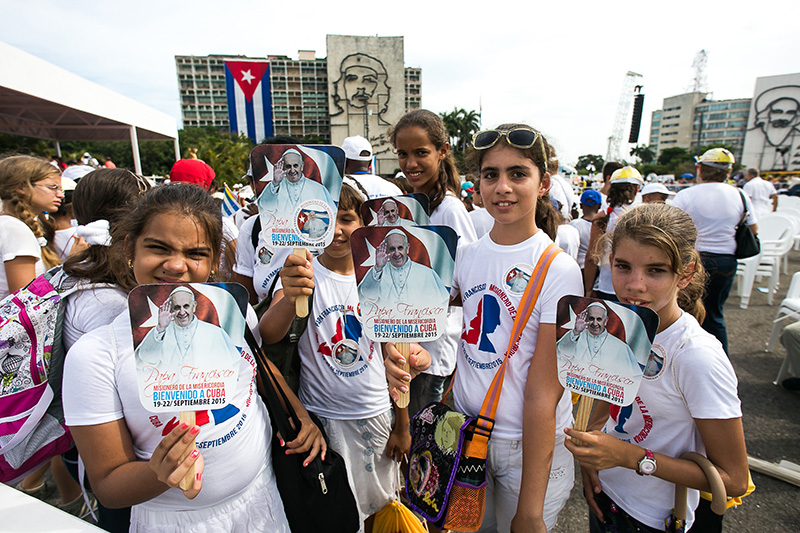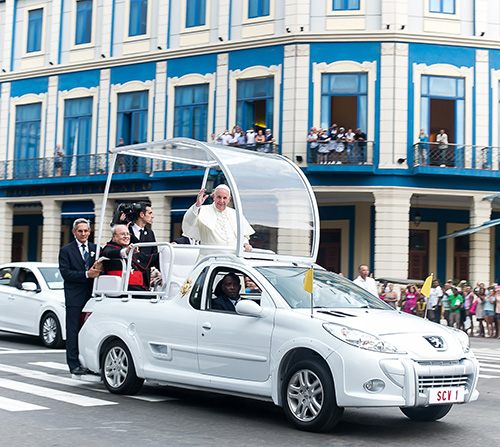By Tom Tracy - Florida Catholic

Photographer: ROCIO GRANADOS | FC
Pope Francis tours the Plaza of the Revolution in his pope mobile before celebrating Mass on Sept. 20, 2015 on his pilgrimage to Cuba. Nearly 200 pilgrims from the Archdiocese of Miami, led by Archbishop Thomas Wenski, took part in the Mass.
MIAMI | Almost a full decade ago, the Archdiocese of Miami led a pilgrimage from Miami to Havana in support of the late Pope Francis’ visit to Cuba early in his papacy.
The historic encounter, in September 2015, was scheduled just before the pope’s three-city visit to the United States, culminating in the World Meeting of Families in Philadelphia.
It was perhaps a time of greater hopes for thawing relations between the U.S. and Cuba and represented a third papal pilgrimage to the island since St. John Paul II’s visit in 1997 and Pope Benedict’s visit to Cuba in 2012.
Now pastor of St. Augustine Parish in Coral Gables, Father Richard Vigoa, who helped coordinate the Florida pilgrimage along with Miami Archbishop Thomas Wenski, said he recalled how at Havana’s Plaza de la Revolución — a space historically reserved for political rallies — Pope Francis delivered a powerful homily centered on the Christian call to service.
“He declared, ‘Service is never ideological, for we do not serve ideas, we serve people… Whoever does not live to serve, does not ‘serve’ to live,’” Father Vigoa recalled.
“These words, spoken beneath the gaze of revolutionary icons, carried a subtle yet profound challenge to both the state’s authoritarianism and the Church’s own mission: to prioritize the dignity and needs of individuals over abstract doctrines or political agendas.”
While St. John Paul II boldly criticized both authoritarian socialism and rampant capitalism, and Benedict XVI called for “authentic freedom” in Cuba, Father Vigoa, who is himself Cuban-American, said Pope Francis focused on the individual’s role in fostering community and compassion.

Photographer: ROCIO GRANADOS | FC
A catechist in the Church of Our Lady of Charity in Union de Reyes, Matanzas, Cuba, shows her support for Pope Francis before his first Mass in Havana on Sept. 20, 2015. Nearly 200 pilgrims from the Archdiocese of Miami, led by Archbishop Thomas Wenski, took part in Pope Francis' first Mass in the Plaza of the Revolution.
Pope Francis died at age 88 on Monday, April 21, one day after his last public appearance during Easter festivities. His funeral was held Saturday, April 26 in Rome.
“His emphasis on personal service and reconciliation aligned with his behind-the-scenes efforts to mediate the restoration of diplomatic ties between Cuba and the United States — a milestone that underscored the Vatican’s enduring commitment to peace and dialogue,” Father Vigoa said, adding that this year, Cuba has released over 500 prisoners in honor of the Holy Year, a gesture that reflects the ongoing influence of the Pope’s message of mercy and reconciliation.
“His visit reinvigorated the Cuban Church’s role in civil society, encouraging a renewed focus on serving the vulnerable and advocating for greater religious freedom,” the priest added.
“For our archdiocese, accompanying a large group of pilgrims to witness Pope Francis’s Masses in Cuba was a profound experience,” he added.

Photographer: TOM TRACY | FC
Cubans await the arrival of Pope Francis for his final Mass in Havana in September 2015. The Archdiocese of Miami led a pilgrimage from Miami to Havana in support of the late Pope Francis’ visit to Cuba early in his papacy.
Pope Francis’ visit to Cuba was also more than a diplomatic event; it was a pastoral mission that left an indelible mark on the island’s spiritual landscape, the priest noted.
“By emphasizing service over ideology and compassion over division, he offered a vision of the Church as a beacon of hope and a catalyst for genuine human connection,” Father Vigoa said.
Vivian Manerrud, former owner of the now-closed Airline Brokers in Miami and one of the professional travel planners of the archdiocesan trip to Cuba, said she fondly recalled that pilgrimage as one of “perfection” in terms of the experience for the U.S. pilgrims.
Now retired in the Midwest, Manerrud recalled how not only did many of the pilgrims (including more than a few Cuban-Americans) have intense religious and emotional encounters in Cuba, but that Pope Francis projected just the right Christian values and sentiments while there.
“He lived a life representing the underprivileged — whether the indigenous people of South America, the poor, the sick – nothing got past him, and he knew every word he was saying. It was not his style to be nasty,” Menerrud said.
“I will remember Francis as a man of the people; a man not only who practiced the Christian faith, but lived the faith as Christ would have,” she added.
Manerrud acknowledged that Pope Francis’ legacy may be a contentious one and that he had many strident critics even within the Christian community, but that she finds it heartbreaking to see any disparaging comments online following Pope Francis’ passing.
“This is a man who was as Christlike as you can get. I wish I had his patience,” she added.
Of his recent passing, Manerrud noted: “Someone said he died like a strong oak tree - standing up. Weren’t we lucky and blessed to see him in Cuba?”

Photographer: TOM TRACY | FC
Pope Francis takes a final ride in his pope mobile in Havana following his closing Mass at the Plaza de la Revolution in Havana at the end of his September 2015 pilgrimage to Cuba. Archbishop Thomas Wenski led nearly 200 people from the Archdiocese of Miami on the pilgrimage.
For his part, Father Vigoa said that in the years since Pope Francis’ pilgrimage to Cuba, the island’s social and economic conditions have continued to deteriorate and that much work remains ahead for Cuba and the Church there.
The promises of dialogue and reform have been met with ongoing hardship, political repression, and widespread emigration according to the priest.
“The Church, while renewed in her mission, still faces limitations in her ability to serve openly and freely. But even amid worsening landscapes, we do not lose heart. The seeds of hope sown during that visit continue to grow quietly in the hearts of the faithful,” he said.
“As Christians, we live not by the headlines of despair, but by the eternal promise that Christ is with His people—and that true transformation is always possible.”

